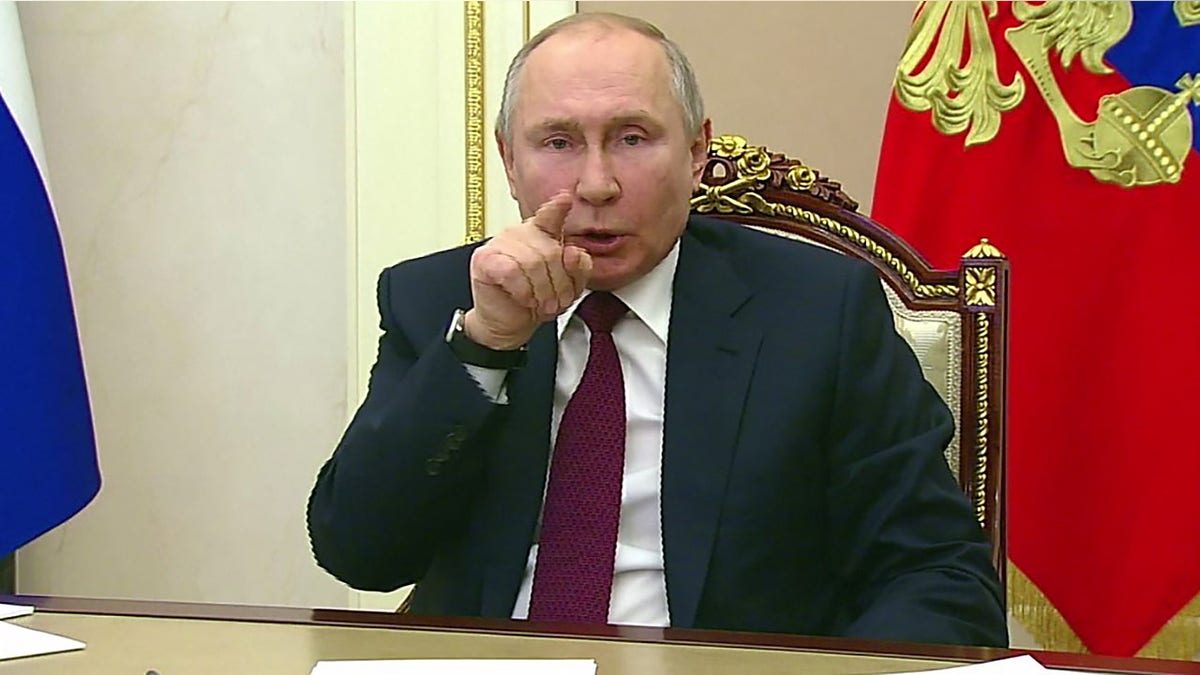John Kirby assures 'severe' consequences if Putin makes incursion into Europe
Pentagon spokesperson provides insight on Russia-Ukraine tensions and reveals the purpose of heightening the readiness of U.S. troops on 'The Story.'
After the Biden administration announced that several thousand American troops should be at-the-ready for a potential, accelerated movement in concert with the North Atlantic Treaty Organization, "The Story" host Martha MacCallum pressed Defense Department spokesperson John Kirby on the specifics of the plan and whether it will actually deter Russian President Vladimir V. Putin from further invading Ukraine.
Kirby, told Fox News on Monday that the current troops are part of what would be the U.S.' contribution to NATO, and that they would not be sent directly into Ukraine but instead to any number of neighboring countries that are currently NATO members.
NATO members Romania, Hungary, Slovakia and Poland all neighbor Ukraine to the west or southwest, while Latvia, Estonia and Norway directly border Russia.
"[NATO has] a 40,000-force-strong response force. Some of it would be in a very-ready task force of about 20,000. So most of these troops would be our contribution. The United States' contribution to this NATO readiness force that would be on sort of a high alert inside the alliance," he said, reiterating that there has been no deployment order and that the announcement is somewhat of a precaution.
RUSSIA TO STAGE ‘UNWELCOME’ NAVAL DRILLS OFF IRELAND COAST

Putin, in the wake of Biden's comments, says Russia knows "how to defend our own interests." (Reuters)
"All we're doing today, Martha, is telling these units you need to get ready and you need to be ready to go on a shorter timeline than maybe you were before. No deployment orders have been signed today," Kirby said. "They're not leaving the United States today or in the imminent future, but we want to make sure that they're ready in case they're asked."
"These [U.S.] troops, if activated by the alliance, not by the United States … would go to NATO's allies, mostly on the eastern flank of the alliance, [who] would want that kind of capability, additional robust defensive capability inside their borders," Kirby said.
MacCallum countered that sending American troops to the Eastern front wouldn't necessarily deter Putin from once again invading Ukraine, as he would then not be met immediately by Western forces.
BIDEN ‘THE JAMES BUCHANAN OF OUR TIME’: LEVIN
"But that wouldn't prevent Vladimir Putin from going into Ukraine, just because there are troops that are positioned in other countries around there, and especially when he knows -- and has been told by the White House – that no U.S. troops are going to enter Ukraine," MacCallum responded.
Kirby replied that Biden has promised "severe economic consequences" if Putin makes an incursion into the former Soviet state, and that Western allies are ready to join in that response.
"We don't we don't know exactly what Mr. Putin has in mind, but this is designed to make sure that we are meeting our commitments to the NATO's alliance," he said.
UKRAINE SLAMS UNITED STATES FOR ‘EXCESSIVE CAUTION’ AFTER EMBASSY ORDER
Biden previously came under fire for comments made during last week's press conference in which the president said "it depends on what [Russia] does," while making reference to a potential "minor incursion" versus a full-scale invasion.
Those comments were met with a strong rebuke from Ukrainian President Volodymyr Zelenskyy, who said "there are no minor incursions" when it comes to an independent country like his.
"What President Biden has made clear is that there will be severe economic consequences if [Putin] does make another incursion into Ukraine, and the international community will respond as well," Kirby said. "The purpose of these troops is to bolster and reassure our NATO allies, and that's what they will be going to do."
MacCallum went on to note that in Kyiv itself, the State Department has already ordered some embassy staff to begin booking private airfare out of the country, which some observers noted may be to avoid any panicked last-minute evacuations as seen last August in Kabul, Afghanistan.
Kirby said there are no plans to involve the U.S. military in any such evacuations from Kiev.
MacCallum reiterated how the potential movement of troops into the region may not be a strong enough deterrent for aggressive Kremlin action:

GLASGOW, SCOTLAND - Ukraine's President Volodymyr Zelensky presents his national statement during day two of COP26. (Photo by Andy Buchanan - Pool/Getty Images)
"So what I'm hearing is that there's movement of some material, some support for Ukraine troops that could potentially be in other countries. So I guess what is evident in all of that is that it doesn't necessarily deter Vladimir Putin from entering Ukraine. The only thing that he would face would be potential economic sanctions if he goes ahead and does it," she said.
Kirby said the Russians would then encounter a much stronger Ukrainian military force than they did when they invaded Crimea in 2014.
"We are continuing to flow security assistance to them, arms and ammunition. In fact, we had just a couple over the course of the weekend, which arrived in Ukraine -- just from the United States alone -- not to mention the kind of security assistance that the Ukrainians are getting from other NATO's partners and NATO allies in Europe. So they are a more capable force," he said.
"The economic consequences are not to be shrugged off Martha. They're significant and severe, as some of them are ones we've not chosen to use before, and it would just further isolate Russia from the international community. "
MacCallum and Kirby both noted that the American presence in Ukraine remains limited to advisers and "trainers" and not any engagement force.
"They're assisting the Ukrainian armed forces as they develop better competence and battlefield skills. They're still on the ground right now. We're watching this very, very closely," said Kirby.

